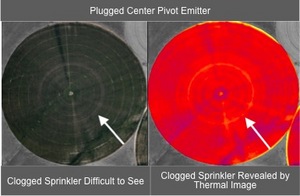SAN LEANDRO, CA--(Marketwired - Feb 6, 2017) - TerrAvion, which helps farms take a high-tech approach to improving yield and revenue, announced today that it has raised a $10M Series A round of financing led by Merus Capital, with participation from Promus Ventures, Initialized Capital and 10x Group. Already the largest provider of aerial imagery for agriculture, TerrAvion will use the funds to further expand its presence in key agricultural areas such as the Great Plains, Mississippi Delta and Pacific Northwest.
TerrAvion has a proven track record for helping growers leverage advanced technology to improve yield. The company provides current images and data that help growers spot early-warning signs such as plant health issues and irrigation problems so they can take action before emerging problems become big ones. TerrAvion offers a compelling combination of the fastest and most reliable delivery with the lowest image prices, and unlike others in this space publishes an API for simple and secure integration with complementary technology. TerrAvion's distribution partners include CPS (the largest ag retailer in the U.S.), CHS (the largest agricultural co-op in the U.S.) and Servi-Tech (the largest independent crop consulting and agronomic services company in the U.S.).
Every week, TerrAvion takes hundreds of low-altitude flights to capture bird's-eye views of farms, and then uploads the images to the cloud within hours so growers can plan scouting, management activities and interventions with unprecedented accuracy. TerrAvion imagery is much more detailed and up-to-date than satellite imagery, and far more cost effective than drone-based services. Its customers receive aerial photographs, plant vigor images, thermal images, custom color maps, underlying data, and histograms, at far greater detail than any other aerial imagery provider.
Currently, TerrAvion flights cover more than 20 million acres per week, and crops ranging from corn and soybeans to citrus and vineyard grapes. TerrAvion's founder and CEO Robert Morris, a former U.S. Army drone platoon leader, said his goal is to triple the company's current footprint to offer service to 80 percent of U.S. irrigated agriculture by the end of 2017. "That will require more boots on the ground and wings in the air," said Morris. "We are hiring aggressively and also working to forge more and bigger distribution partnerships across the U.S. in order to expand our presence." Morris noted that every single customer cohort the company has is growing its acreage.
"TerrAvion is providing a valuable service to growers -- helping them improve yields, lower costs and ultimately feed the world," said Sean Dempsey, co-founder and managing director at Merus Capital. "Robert and his team have grown the company methodically using grassroots methods and have earned a stellar reputation in the ag community -- we're excited to partner with them to help accelerate their growth in the U.S. and internationally."
To learn more about TerrAvion's services, visit www.terravion.com. Pricing starts at just $4 per acre, per season.
About TerrAvion
TerrAvion helps farms take a high-tech approach to improving yield and revenue, with the first cloud-based aerial imaging and data analytics service for agriculture. TerrAvion provides growers from small family farms to the largest agribusinesses with current images and data that accurately detail the conditions of every acre, helping identify problems early before they impact yield. Founded in 2013, TerrAvion's investors include Merus Capital, Promus Ventures, Initialized Capital, 10x Group and Y Combinator. For more information, visit www.terravion.com or follow @TerrAvion.
Contact Information:
Contact:
Michelle Faulkner
1-617-510-6998
